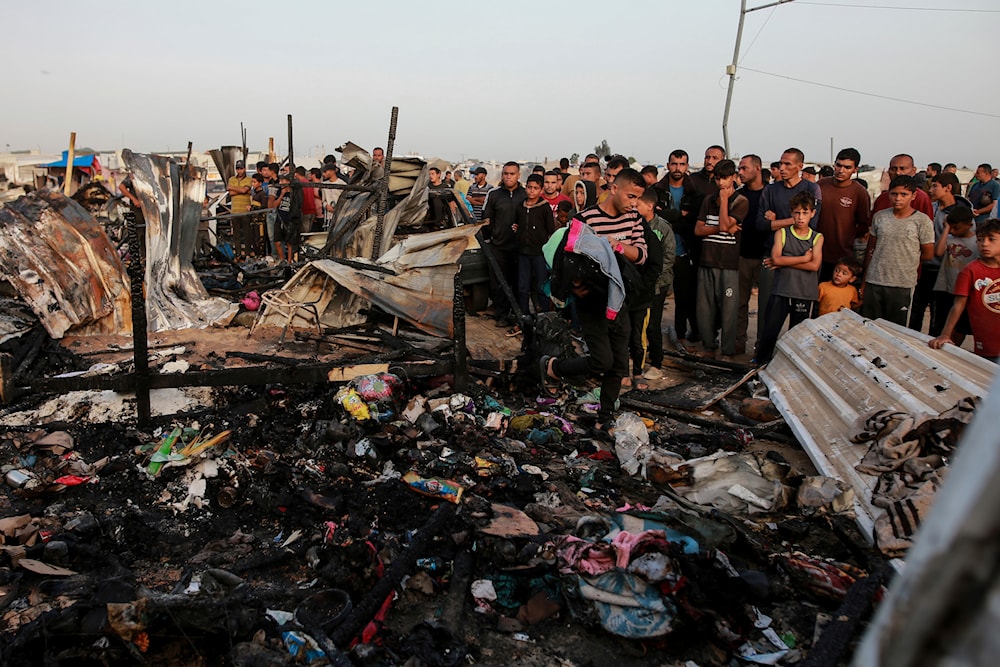'Israel' must be pressured into halting Gaza war, Egypt says
The Egyptian Foreign Ministry warns against the regional repercussions of allowing the Israeli occupation to continue its war on Gaza.
-

Palestinians look at the destruction after an Israeli strike where displaced people were staying in Rafah, Gaza Strip, occupied Palestine, May 27, 2024 (AP)
The Egyptian Ministry of Foreign Affairs issued Monday a stern warning cautioning that the ongoing Israeli military actions in Gaza pose a threat to regional security and stability. The ministry also condemned the Israeli occupation's escalating violence in the West Bank.
Ahmad Abu Zeid, the official spokesperson and Director of Public Diplomacy at the Egyptian Ministry of Foreign Affairs, reported that a recent meeting highlighted discussions on the humanitarian and security dimensions of the current crisis in Gaza. He conveyed Foreign Minister Sameh Shoukry's warning about the detrimental impact of the Israeli occupation's policies in light of the ongoing war on Gaza.
This statement followed a meeting between Egyptian Foreign Minister Sameh Shoukry and his Swedish counterpart, Tobias Billström, held on the sidelines of the European Union Foreign Affairs Council meeting in Brussels. The discussions focused on strengthening bilateral relations and addressing regional developments, particularly the ongoing war on Gaza.
Shoukry emphasized "the severe humanitarian crisis faced by the Palestinian people," calling for "intensified international efforts to pressure the Israeli occupation into halting its military operations in Rafah and ending policies that obstruct the delivery of humanitarian aid to Gaza."
Furthermore, the Egyptian Foreign Minister criticized the Israeli occupation's control over the Palestinian side of the Rafah border crossing, stressing that it was being used to tighten the siege and impose starvation on the residents of Gaza.
Furthermore, Shoukry reaffirmed Egypt's "unwavering commitment to pursuing political and diplomatic efforts to secure an immediate ceasefire." He condemned the Israeli expanded military operations in Rafah, warning that "targeting densely populated civilian areas could result in one of the largest genocides of the 21st century, a grave violation of international law."
Both foreign ministers underscored the importance of a political resolution to the Palestinian cause, advocating for a "comprehensive settlement based on the two-state solution in accordance with international legitimacy." They stressed the necessity of enabling the Palestinian people to establish an independent and viable state within the June 4, 1967 borders, which allow "Israel" to continue occupying land usurped in 1948.
Swedish Foreign Minister Tobias Billström praised Egypt's role in "maintaining regional stability" and commended its "balanced and wise approach to the Gaza crisis and its related regional challenges."
He reiterated Sweden's call for "Israel" to open all crossings to facilitate the delivery of urgent humanitarian aid, addressing the dire health and humanitarian situation in Gaza.
The talks also explored ways to enhance bilateral relations, particularly in economic cooperation. Shoukry expressed Egypt's interest in developing partnerships with Sweden in promising sectors such as renewable energy, information and communication technology, and digital services. Both ministers discussed investment opportunities in these fields in Egypt.
Egypt rejects Israeli actions
An Egyptian source described as "high-ranking" confirmed Saturday to Cairo News that Egypt will not stand idly by in the face of the dire humanitarian crisis in Gaza. He emphasized that Egypt is committed to finding solutions to aid the region and stressed that Cairo "will not accept the policy of fait accompli" that "Israel" is trying to impose.
The source's comments followed an Egyptian-American agreement to send aid to Gaza through the Karem Abu Salem crossing.
The source stated that the Rafah border crossing is an Egyptian-Palestinian crossing and that Egypt will resume sending aid through an agreed-upon mechanism coordinated with the Palestinian Authority. He emphasized that "Egypt will continue to resist any attempts to undermine the Palestinian cause or isolate Gaza from the world."
The same source, whose identity was not disclosed by the channel, noted that "Egypt and the US agreed to temporarily send aid through the Karem Abu Salem crossing, stemming from Egypt's commitment to alleviate the impact of aid shortages." He added that "Egypt is dedicated to mitigating the shortage of aid by sending it through Kerem Abu Salem until the Rafah crossing returns to normal operations."
The source also confirmed that Egypt is committed to the principles of the Palestinian cause and refuses the policy of fait accompli being imposed on the ground. He stressed Egypt's determination to find temporary solutions to deliver fuel to Gaza to ensure the operation of the hospitals that have ceased functioning.

 4 Min Read
4 Min Read








